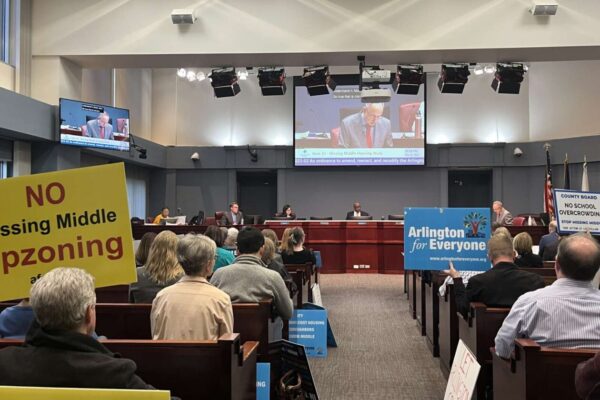
After the Arlington County Board voted this week to allow multifamily structures in single-family home zoning, some Alexandrians looked north as a hopeful example and others as a warning of what could be ahead.
The Missing Middle vote — referring to the multi-family structures that proponents hope will help make housing more affordable — created nearly unprecedented levels of controversy in Arlington County.
Just hours after the vote, leading advocates in favor of eliminating single-family zoning said the next step of the fight is in Alexandria.
The next big upzoning fight will be in Alexandria, let's check in on the local NIMBYs: "How about a population cap?" pic.twitter.com/yQIgvG7mtN
— Luca Gattoni-Celli (@TheGattoniCelli) March 23, 2023
Alexandria just launched a major new affordable housing initiative this week called Zoning for Housing/Housing for All, aiming to reshape parts of the city’s zoning code from the ground up to further emphasize affordable housing, but those plans stop short of eliminating zoning for single-family housing.
Luca Gattoni-Celli, founder of YIMBYs of NoVA, spoke at the City Council last year and argued in favor of reform to single-family zoning. But while Alexandria’s generally been a regional leader in pushing for affordable housing, city leaders have been reticent to jump onto the “eliminate single-family housing zoning” bandwagon.
Alexandria’s Mayor Justin Wilson said it won’t be as simple as copying and pasting Arlington’s approach into Alexandria. According to Wilson:
While Alexandria and Arlington are similar communities, there are clearly big distinctions as well. When crafting answers to our shortage of housing and inequitable access, we must develop an Alexandria approach. Arlington’s actions offer some lessons as well as urgency for our work.
Bill Rossello, a former City Council candidate and current President of the Seminary Hill Association, said his biggest concern is that a similar “Missing Middle” debate would be just as divisive in Alexandria as it has been in Arlington.
Rossello said he is concerned the Housing For All initiative could take Alexandria in a similar policy direction as Arlington and eliminate single-family home zoning. But like Wilson, Rossello said Alexandria’s housing landscape is different enough from Arlington that the housing affordability issues can’t be approached in exactly the same way:
The communities are fundamentally different even though they’re next-door neighbors as it relates to housing. We have a much wider array of housing than Arlington does. We’re more urbanized already and much more densely populated. Our single-family home housing stock is much lower. The detached single-family housing stock in Alexandria covers about 29% of the land parenthetically… and only accounts for about 12% of the housing units. In Arlington it’s the reverse, more than 70% of the land is within single-family home zones.
Rossello said in some ways, the land constraints already make questions about single-family homes moot.
“We just don’t have enough land to build single-family homes,” Rossello said. “But where we get chunks of land to satisfy the economic objectives of a developer while not creating crazy amounts more density [is] probably townhouses… I actually think the answer might be more townhouses as opposed to apartments.”
Rossello said Alexandria also needs to do more to explore three-bedroom opportunities.
“A lot of homes on Seminary Hill are small single-family homes,” Rossello said. “We need more of those opportunities so people who are 30-35 can find something they can afford but also meets their needs so they can have a baby and two dogs. What’s our missing middle? Our missing middle is that.”
A virtual community listening session for Zoning for Housing/Housing for All is scheduled for tonight (Thursday) from 6-8 p.m. A presentation on the initiative is scheduled for the start of the meeting, with captioning and interpretation services in Spanish, Amharic and Arabic. The Webinar ID for the Zoom meeting is 960 0721 3678 and the passcode is 727732.
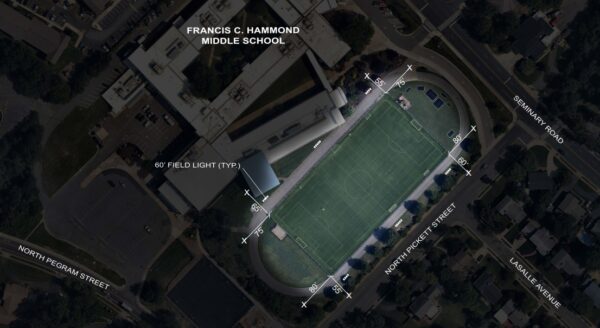
Updated 5:45 p.m. — Field lighting supporters told ALXnow the interests of neighbors and soccer players aren’t necessarily competing and share some overlapping concerns management of the fields.
Earlier: A plan to bring new lights to athletic fields around Alexandria saw a clash of supporters — who say the lights are necessary for extending play hours — against homeowners concerned about the ramifications of new late-night activity next door.
Last week, the Planning Commission voted unanimously in favor of the plan for new lights, which will now go to the City Council on Saturday, Nov. 12.
The plan is to eventually install new outdoor lighting at five fields around the city, with those lights phased in as the budget and construction timetables allow. Three of the fields could be lighted as early as FY2023:
- Francis C Hammond Middle School, 4646 Seminary Road
- George Washington Middle School, 1005 Mt. Vernon Avenue
- Jefferson Houston K-8 School, 1501 Cameron Street
The other two, Patrick Henry K-8 School and Recreation Center (4643 and 4653 Taney Avenue) and Eugene Simpson Stadium Park (426 East Monroe Avenue), can’t be lighted until 2024 and 2025 respectively. The aim of the lights is to extend the usable hours of some of the city’s more overcrowded fields.
There were around 20 speakers at the Planning Commission meeting on Tuesday, Nov. 1, with a fairly even split between parents and local soccer enthusiasts with the Alexandria Soccer Association (ASA) sharing their support for the lights and neighbors concerned that existing issues like littering and public urination will only get worse with the lights creating extended hours.
Those in favor of the lights said they will help relieve some of the problems around local teams fighting for a handful of evening spots.
“[The lights] provide more access for healthy places to play, thus positively impacting the community,” said Jim Hogan, a coach with the ASA. “As one of 200 volunteer coaches who supported over 180 teams this fall, location and times for mid-week practice are very hard for working parents when they are 4, 4:30, or 5 p.m. start times. Evening times are so popular we cannot provide every team and program with a 6 p.m. start time.”
Hogan said there are parents who want to help volunteer on local teams, but can’t because the practice times are too early.
Terry Androus, a manager with the ASA, said the lights are a matter of boosting public safety for local kids.
“I support the addition of lights to all of the fields being suggested,” Androus said. “Youth sports is a critical component of raising healthy and productive citizens. Kids will be somewhere after dark; it’s better to have them in a structured environment on a field rather than wandering around places where trouble may find them. Let’s provide a safe place to play after dark: it just makes sense.”
But neighbors abutting the fields where lighting is proposed said there are unresolved issues in the city’s plans. Carter Flemming, President of the Seminary Hill Association, said neighbors currently experience loud music, trash, and other nuisances from adults playing on nearby fields and are concerned that adding more hours will only make the problems worse.
“Hammond Middle School is in our boundaries and we are quite familiar with the issues surrounding this field, even without lights,” Flemming said. “while I know [Recreation, Parks & Cultural Activities] asserts approval tonight is only about putting up lights, I think it’s incumbent upon you to address the ramifications of such lights. To say this [special use permit] is only about constructing some 60-foot tall light poles is to ignore the reality of what those light poles will mean to surrounding residents.”
Flemming pointed to a memo from Recreation, Parks & Cultural Activities (RPCA) in October that acknowledged that there are important issues raised by neighbors near the Hammond Middle School, but said those are operational issues and not a result of field lighting.
“And yet, RPCA is asking to add lights without having any plans to address those known issues,” Flemming said. “No developer could come before PC and say ‘I have submitted a [special use permit] to build four walls, 60 feet high, but I do not have to address any other issues that might arise from my project.'”
Neighbors shared testimony at the meeting of trash left littered around fields after soccer games, sharing photos of debris-strewn sidelines despite assurances from city staff that the fields were checked and cleaned before every school day.
Others said that, during and after games, players at the fields use nearby yards and streets as public urinals. Jack Browand, division chief of Parks and Cultural Activities, acknowledged that while two of the fields are slated to get publicly accessible restrooms, the others do not have them.
“Restrooms have been a hot topic,” Browand said. “As part of capital improvement, we do assess where restroom use could be. Those are things that we’re looking at as we move forward and do improvements.”
Flemming and other neighbors said they would support the use of lights on the fields for youth sports only.
“Adult recreation creates an entirely different situation from youth sports and should be directed to [other fields] that do not abut residents,” Flemming said.
Another concern, one shared by some on the Planning Commission, was that the several organizations all connected to overseeing the fields could make it more difficult for residents to find any one department to connect to and hold responsible for maintenance issues.
After the public comment, Browand clarified that the fields would only but lit for pre-arranged sporting events scheduled by permit, giving the city some level of control over who plays on the fields and who is responsible if trash is left behind.
Planning Commissioner David Brown drilled down on issues of accountability for the fields, saying he sympathized with concerns that — when issues do occur on the fields — residents will find city departments all pointing the finger at each other.
“As I understand it, the city is responsible for trash collection,” Brown said. “The Recreation and Parks folks are responsible for monitoring use and making sure the lights are turned off. During the school day, Alexandria City Public Schools is responsible for monitoring the facilities, possibly with the assistance of the police. This is a lot of cooks in this stew. What I would like is reassurance that at least insofar as this process has been ongoing with a number of fields for quite some time: is it operating smoothly so that when something goes wrong, it is promptly fixed?”
Despite raising these concerns, Brown said that ultimately the Planning Commission vote is not about whether or not the lights are a good idea or whether the city is doing a good job of managing the parks currently: only whether the project meets the zoning requirements.
Others on the Commission said they recognized neighbor complaints, but saw the lights as achieving a greater good.
“While I’m sensitive to what sounds like adults being irresponsible neighbors, I think it’s important to not discount the need to provide for adult recreational activity,” said Planning Commissioner Melissa McMahon. “Adults tend to work more than they should and tend to have a lot of stress. We might not focus as much as adults on growing our own social skills and managing to get along with one another the way we teach our children those skills, and team sports are one of our best tools for that.”
Ultimately, the Planning Commission voted 6-0 in favor of the lights.
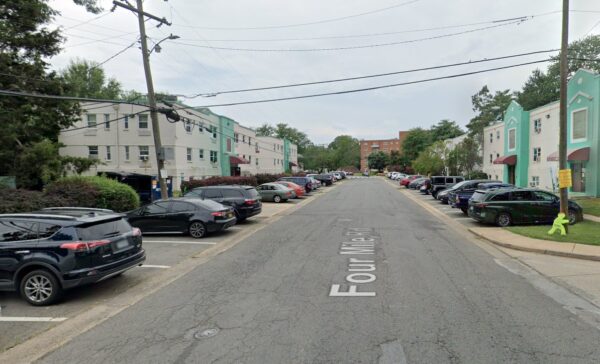
After work on city sidewalks and alleyways, Alexandria is headed back to Seminary Road for more neighborhood street resurfacing over the next week.
Between yesterday (Sept. 6) and next Friday (Sept. 16), the Department of Transportation and Environmental Services will be hitting up several neighborhood streets around Seminary Hill and Arlandria.
“Residents whose streets are scheduled for resurfacing receive advance notice of paving work — typically by displayed project signs and/or letters,” the city said in a release. “Temporary ‘No Parking’ signs will also be posted before work begins. Please be sure to observe signs to avoid tickets and towing of vehicles.”
The full list of streets being resurfaced over the next week:
- Bennett Street (from Saylor Place to end)
- Saylor Place (entire length)
- Sterling Avenue (from North Quaker Lane to end)
- Coventry Lane (from North Quaker Lane to end)
- South Floyd Street (from Duke Street to Wheeler Avenue)
- Notabene Drive (from Old Dominion Boulevard to Four Mile Road)
- Four Mile Road (from Mount Vernon Avenue to Florence Drive)
- Aspen Street (from Landover Road to Russell Road)
Image via Google Maps
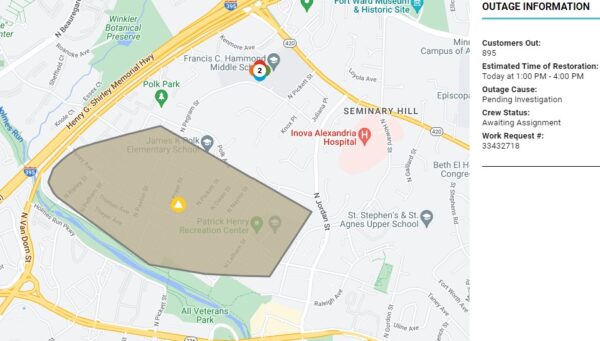
Updated 11:50 a.m. — As of around 11:30 a.m. the power outage was resolved
Earlier: Around 900 Alexandria residents are currently without power due to an outage near James K Polk Elementary School.
The school itself hasn’t been hit with the outage, but Dominion’s outage map says 895 of their neighbors have.
The cause of the outage is still under investigation. The area was also hit with outages during the storm last week.
The estimated time of restoration is between 1-4 p.m., though those tend to be conservative estimates.
There are over 2K @DominionEnergy customers presently experiencing an outage on the West End.
Report outages at 866-366-4357 or online at https://t.co/P7thQdZmld pic.twitter.com/2oTMdWTrat
— Justin Wilson (@justindotnet) August 16, 2022
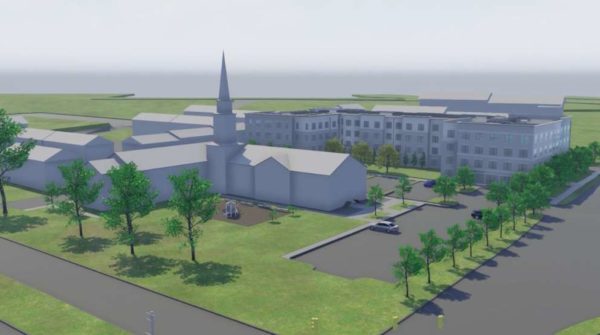
Updated 8/5 — The Feathers Bilingual Academy is opening at the Fairlington Presbyterian Church at the same site, not at The Waypoint at Fairlington
A new daycare center called Feathers Bilingual Academy has submitted an application to open at Fairlington Presbyterian Church (3846 King Street) near The Waypoint at Fairlington, a new 81-unit affordable housing development set to open this fall.
The application said the center focuses on early education for children ages 16 months to 5 years old.
Feathers Bilingual Academy will have a capacity for 52 children with approximately eight teachers. There have already been some job postings for positions like pre-school teacher and bilingual toddler lead teacher.
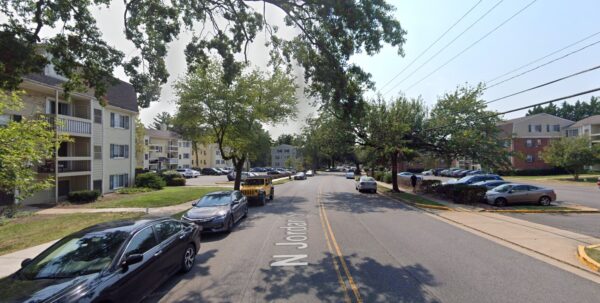
July is packed with holidays in Alexandria: Independence Day, the city’s birthday, and most importantly peak street repaving season.
The Department of Transportation and Environmental Services unveiled the latest batch of streets targeted for resurfacing and maintenance over the next two weeks, many of them around the Seminary Hill and North Ridge neighborhoods:
- Anderson Lane (from West Windsor Avenue to Richards Lane)
- North Garland Street (from Fort Worth Avenue to End)
- Greenwood Place (from Seminary Road to Circle)
- King James Place (from Seminary Road to End)
- Westminster Place (from Monticello Boulevard to End)
- Mayer Place (from Allison Street to End)
- George Mason Place (from Monticello Boulevard to End)
- North Howard Street (from North Jordan Street to Raleigh Avenue)
- Juniper Place (from North Jordan Street to End)
- Knox Place
The city is also working through sidewalk maintenance, including further work on the King Street sidewalk that started earlier this year.
“You get a newly paved road!
You get a newly paved road!
Everybody gets a newly paved road!”
Okay, it’s not quite Oprah, but our @AlexandriaVATES teams will be working to pave a bunch of roads and fix up sidewalks over the next 2 weeks: pic.twitter.com/sbyzo6sFP8
— Justin Wilson (@justindotnet) July 12, 2022
Image via Google Maps
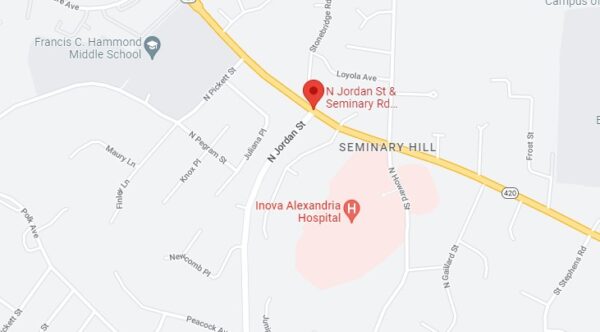
Parts of Seminary Road were shut down last night and early this morning after what police are investigating as a single-vehicle crash following a possible road rage incident near Inova Alexandria Hospital.
Police said there were gunshots reported during the road rage incident. Alexandria Police spokesman Marcel Bassett told ALXnow that the car that crashed was reportedly the victim of the road rage incident and swerved off the road to avoid gunshots.
“Seminary Road from Howard to Jordan Streets is temporarily closed,” police said. “This is due to a single-vehicle car crash stemming from a possible road rage incident in which shots were fired.”
Police said there were no injuries as a result of the shooting, but minor injuries were sustained in the crash.
Seminary Road from Howard to Jordan Streets was closed last night but reopened early this morning.
Notification:: Seminary Road from Howard to Jordan Streets is temporarily closed. This is due to a single-vehicle car crash stemming from a possible road rage incident in which shots were fired. No injuries as a result of shots fired. Minor injuries sustained in the car crash. pic.twitter.com/ZfOA9cBVs6
— Alexandria Police (@AlexandriaVAPD) June 1, 2022
Image via Google Maps

There are individual developments that can attract controversy but stepping back there’s a broader issue addressed at an Agenda Alexandria discussion last night with city leaders, developers and civic association representatives: whose vision shapes the future of Alexandria?
The discussion, moderated by Board Member Rod Kuckro, tackled a variety of development issues, including the slow death of office and commercial space in projects over the last few years.
For Carter Flemming, President of the Seminary Hill Association, there’s a concern that resident voices are being drowned out by the interests of developers.
“The voices of citizens need to be a better part of this equation,” Flemming said. “Many of the civic associations and the Federation believe over the last few years, the role of our associations and voices has been lessened as voices of developers and urban think tanks have taken a bigger role in our city… Many of us do not believe the City is working together with current residents. They’re building for a future we may or may not be a part of, but we should have a voice.”
On the City side, former Mayor Kerry Donley said there is an inherent incentive towards development for the City, as new development means more tax revenue to fund services.
“The City derives the bulk of its revenue from real property taxes; that’s how we grow and provide services,” Donley said. “It’s not accurate to say the council or the city is always looking in the developer’s favor, but under our way of governing in the Commonwealth of Virginia there is an inherent incentive for this locality and every locality to develop real property because that’s where we derive revenue to provide services.”
Donley and others in the discussion also outlined significant changes coming to what’s developed in Alexandria. Donley said the big push is for residential development, as brick-and-mortar commercial businesses were already facing a difficult battle against online retail pre-pandemic and a shift towards remote work drove a stake through the office market.
“Demand for commercial space is next to nill, but demand for residential is the highest and best use for properties,” Donley said.
Karl Moritz, Director of Planning and Zoning for the City of Alexandria, said the challenges from the pandemic and more force the city to reconsider older plans.
“We are, as Kerry was saying, facing a set of challenges that none of our jurisdictions have faced before,” Moritz said. “There is certainly a desire to ensure that our master plan, which is guiding orderly growth, is reflecting new challenges that are coming.
Moritz also said there’s a much greater emphasis now on bringing additional voices to city meetings beyond just civic associations.
“Our expectation is that people who have never been involved before are added to the mix,” Moritz said. “It’s a stronger system when more voices are heard.”
Austin Flajser, President & CEO of The Carr Companies, said he believes the voice of developers in city policymaking is overstated.
“Fundamentally, [development] starts with the rules in place,” Flajser said. “It starts with a small area plan and that shapes the concepts of what is viable and not viable… If there are developers that have a big voice in the process, I’d like to meet them. I don’t feel like I have a big voice in the process. We follow the rules as laid down.”
The next step, Flajser said, is to look at market demand.
“Just because I’m allowed to build a hotel doesn’t mean I’ll build a hotel if the demand isn’t there,” Flajser said. “I can’t imagine someone building an office building in the near future.”
One of the touchier topics raised in the discussion was single-family zoning. While city leaders have been reconsidering zoning laws in a push toward greater equity, some local residents have expressed concerns that the end goal is the elimination of single-family zoning.
The topic was raised, but only Moritz responded and with a somewhat nebulous answer:
First, because I’m a planner of a certain age: personally I feel I have responsibility as part of the regulatory infrastructure that allowed what started out as an intentional disinclusion of people of color from single family neighborhoods, intentionally keeping families of color from wealth-building opportunities, and that for years we pretended it hadn’t happened and it was okay because we’d legislated that people couldn’t be disciminated against. But that ignores the long-term impact on those families.
It’s a good idea to come together and talk about those things. As for what comes out of those conversations: I have an extraordinary optimism about Alexandria and its ability to talk through issues like that and come up with the right approach. I believe that those conversations would be healthy and I look forward to doing my part.
The Alexandria Housing Development Corporation is planning to head to city review by the end of the year for a new project that will add 31 affordable housing units to the Seminary Hill neighborhood at 4547, 4555, and 4575 Seminary Road.
“The Applicant, the Alexandria Housing Development Corporation (AHDC) is seeking to consolidate three lots into one and build a condominium project that includes 31 affordable for-sale townhouse-condo units that target average median incomes (AMI) at or below 80% and 8 rental and for-sale multi-family units,” AHDC said in an application.
Three of the multi-family units will be 4-bedroom housing units operated by Sheltered Homes of Alexandria, which will help expand the number of intellectually disabled adults currently served at the group home at 4547 Seminary Road. The remaining five multi-family units will be for sale at 80% AMI or below.
Each of the townhouse units will have 2 parking spaces in an attached garage, the application said. The multi-family units will have access to 19 surface parking spaces, with 12 spaces for residents and seven for visitors.
“The applicant firmly believes that this project serves many goals of the city, but most importantly, by increasing affordable homeownership opportunities for residents with low and moderate incomes, it serves the goals of the city’s Housing Master Plan,” the AHDC application said. “Particularly, the project furthers the city’s goal of creating economic diversity among city residents resulting in strong, resilient neighborhoods…”
The project is scheduled to be reviewed at the Planning Commission on Dec. 7.
The Seminary Road Diet took center stage Tuesday night, as City Council candidates met in the first of three West End forums.
City Council candidates Canek Aguirre (incumbent), Alyia Gaskins, Kirk McPike, Patrick Moran and Sarah Bagley were the first batch of candidates to speak at the Seminary Ridge Civic Association candidate forum.
The group was first questioned on the role of civic associations in policymaking discussions, since 13 civic associations were opposed to the road diet, which was approved in a 4-3 Council vote in 2019.
Aguirre voted for the road diet, and said that the opinions of the civic associations were taken into consideration at the time.
“I don’t think that the civic associations were ignored,” Aguirre said. “We listened, we disagreed and that showed in our vote… I want us to be able to get back to a place where we can be able to disagree in a civil way.”
All the candidates said that civic associations are important, as are the recommendations from the city’s board and commissions.
McPike said that, if elected, he intends to conduct regular town halls across the city, and to work with civic associations to participate.
“It’s important that we’re hearing from a wide range of opinions and the civic associations can be channels by which to bring that input into our policymaking process,” McPike said. “The next council has to be ready to help the city fully recover from the effects of this difficult year. And I believe in my time working on city Commission’s and my legislative skills from Capitol Hill will enable me to hit the ground running on day one, to help the city do exactly that.”
Moran previously said that he would vote to reverse the road diet if elected, while Gaskins said that she would not reverse it and that funds could be better spent elsewhere.
Most candidates were opposed to the idea of colocating affordable housing on the grounds of Alexandria City Public Schools, but none want to back an ordinance preventing it from happening.
“We have to look at everything that’s on the table,” Aguirre said. “If it’s an argument around safety, then I fundamentally reject that argument, because when you look at the schools that we have today in Alexandria, you literally have schools that are across the street from million dollar homes and from public housing. If you don’t believe me, come take a trip with me. I’ll take you around the different schools and show you.”
Bagley, who runs an affordable housing nonprofit in D.C., said that schools need to be left alone.
“We have a shortage of capacity for schools themselves and for classrooms and recreational spaces and pools and all those issues,” Bagley said. “While I think we have many other more pressing ways to use our city on spaces, I would not push for a permanent bar to consider it in an architectural consideration.”
Moran only wants colocation of housing for teachers at ACPS.
“Alexandria’s average starting pay for teachers is $56,000,” Moran said. “That’s not enough to live in our city…. I don’t think we ought to be looking at housing for any other types of scenarios to meet our housing goals. I think that we can find solutions alternatively for that, but for teachers, yes.”
The second forum will air at 7:15 p.m. on Thursday, May 20, and feature candidates Bill Campbell, John Taylor Chapman, Darryl Nirenberg, Bill Rossello and Meronne Teklu; followed by the final Council candidate forum on Monday, May 24, with Kevin Harris, Amy Jackson, Jim Lewis, Florence King and Mark Shiffer.
The mayoral forum between Mayor Justin Wilson and former Mayor Allison Silberberg is at 7 p.m. on Thursday, May 27.
Early voting has already started, and the Democratic primary is June 8.


